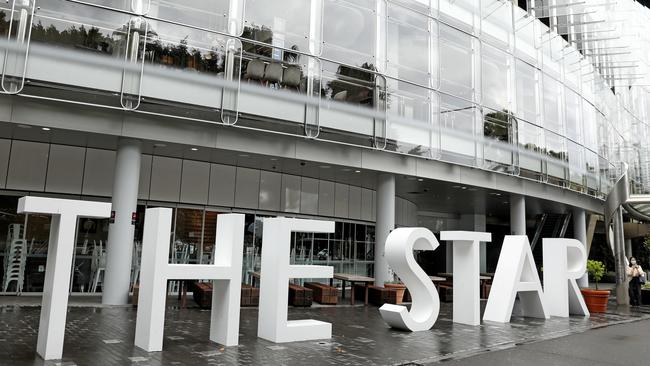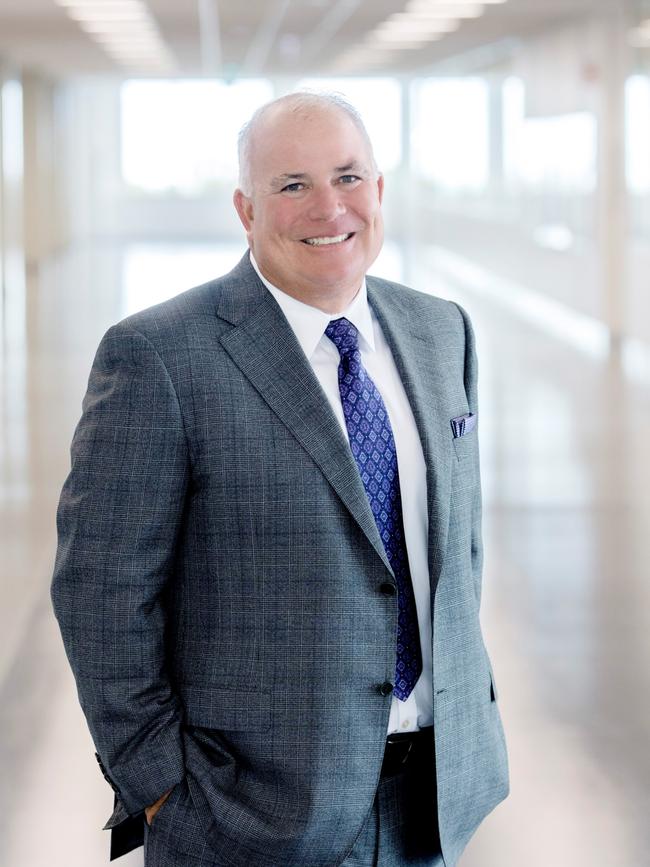ASIC’s blockbuster Star chase turns up the heat on all directors
The legal battlelines are being drawn around how boards question and probe management.

Business
Don't miss out on the headlines from Business. Followed categories will be added to My News.
The Australian Securities and Investments Commission chair Joe Longo has dramatically raised the stakes over what the regulator expects from boards, including actively challenging management while taking all reasonable steps to minimise material risks when it comes to running a big company.
That’s the takeout from the blockbuster legal action centred on troubled Star Entertainment’s former board, led by chair John O’Neill, over a string of allegations that largely test whether the board and management team deliberately looked the other way when it came to the casino becoming caught up in money laundering and criminal associations.
The case has been lodged just weeks after Austrac launched its own case against Star over dozens of alleged breaches of money laundering rules, which if proved against the company will result in a heavy fine.

By going after 11 of Star’s former and several current directors and former top managers including former boss Matt Beikier, ex-finance boss Harry Theodore and former chief legal officer Paula Martin, ASIC’s Longo has squarely put in the frame the principle of collective responsibility in the boardroom for corporate failings.
ASIC’s tougher application of alleged breaches of directors’ duties under the Corporations Act in the Star case has implications for any company caught in the eye of a major scandal.
Indeed, it could pave the way for ASIC to pursue other boards it believes have failed a directors’ duty test around managing critical risks. This could range from cyber attacks to workplace safety or even miners breaching environmental rules.
ASIC is pursuing the case as a civil action, which means the court only needs to be convinced on the balance of probabilities. The maximum fine for a breach of directors’ duties is just over $1m. Significantly, the corporate entity Star is not subject to the legal action. Current chair Ben Heap is also named and has said he plans to step aside once board renewal is in place.
Underlining the high stakes, there’s been only one other case when ASIC has launched a legal action against an entire board, that being James Hardie in the early 2000s.
Other cases include property group Centro and more recently technology player Nuix, where several directors and executives were subject to a legal action.
Longo tells The Australian the case “shines a light on addressing risks and issues that we think are readily foreseeable”.
The issues raised in the case are at the heart of running a casino, Longo says. They range from knowing who the key customers are, the relationship with lenders, junket operators and risks around money laundering. This is distinct from unforeseen and more nuanced risks.
“In the case where you’ve got risks that go to the heart of the business model, then surely that’s incumbent on directors to be focused on those kinds of risks, and to exercise due care and diligence,” Longo says.

“One of the big issues in corporate governance is to what extent can you know the directors rely on what they’re told by the senior executives. And equally, what do we expect senior executives to tell the board? This interaction is crucial to good corporate governance, and I think these proceedings are a good example of a scenario where that gets tested.”
A benchmark has also been set for in-house corporate lawyers, with the ASIC case pursuing Star’s former chief legal counsel Paula Martin.
Since becoming chair of ASIC, Longo, himself a former chief legal counsel with Deutsche Bank, has given speeches about setting high expectations for top legal officers in big business.
“To my mind, they play a crucial role in helping the company and the board manage non-financial risk.
“To my mind, a sophisticated board will expect more from its general counsel than just legal advice … they would expect to be given advice that protects the reputation of a corporation.
“It brings to the attention of the board the material risks that could affect that reputation.”
The case turns on Star’s relationship with junket operator Suncity, which generated more than $2bn in annual turnover for the casino. Here ASIC alleges the board and management were repeatedly made aware of Suncity’s involvement in money laundering activities and links to criminal elements, but failed to act. Former chief executive Bekier, chief financial officer Theodore and chief legal and risk executive Martin are being pursued by ASIC for allegedly misleading National Australia Bank when it came to China Union Pay cards for gaming. At the same time it makes a legal case around executives that allegedly withhold information around corporate risks from board members. Bekier has previously claimed in evidence to the Crawford inquiry that the issue hadn’t been escalated to him, which meant it didn’t reach the board. A successful legal action by ASIC could mean boards become instinctively risk-averse when making major corporate decisions.
What director will want to end up the subject of a legal action because the company made a dud acquisition, underinvested in cyber technology or backed the wrong market to expand in?
Longo says the case shouldn’t be seen as ASIC taking a stand against responsible risk taking and innovation, arguing this is “the last thing we’re on about”.
“But what we are on about is foreseeable risks that go to the heart of the operating model of your business, leading to foreseeable reputational risk and compliance risks.
“You’ve got to have a strategy for dealing with that risk. You can’t ignore it, or not exercise due care and diligence, in the words of the legislation. To my mind, at the extremes, I think it’s pretty clear.” With other companies that have been subject to Austrac fines, from Commonwealth Bank to Westpac, ASIC has already examined their actions and concluded there was no case to mount. Longo has no plans to reopen historical cases. He says the Star case followed a comprehensive investigation, which also examined board minutes and evidence presented to NSW’s Crawford inquiry.
It does raise questions around Crown Resorts, which was caught up in similar allegations to Star and also has an Austrac legal action on foot. But ASIC would require a re-examination of evidence raised during the NSW Bergin inquiry, which is then likely to run into the statute of limitations around allegations against negligence.
This legal action will certainly be closely watched by all corporate directors, given it seeks to set legal boundaries for expected behaviour inside the boardroom. It raises the prospect that a failure to challenge management around critical risks is a breach of director duties.
The longer-term impact is the move is likely to put upward pressure on directors’ fees, particularly for higher-risk and heavily regulated companies, from gaming to financial services, as corporations recalculate potential director exposures. In the near term, premiums for specialised directors’ and officers’ insurance that offers a legal safety net will rise.
In a statement, Star chair Ben Heap said both he and fellow director Katie Lahey, who are subject to the ASIC legal action, would step down once additional directors are appointed to the board, expected by early next year.
“Ms Lahey and I intend to contest the ASIC allegations, but to remain on the board beyond the transitional period would be a distraction to the company when remediation needs to be our unwavering focus,” Heap says.
Smooth transition
Biotech giant CSL has engineered another smooth hand-over of management, with Paul Perreault to step down in March after 10 years in the role. He will be replaced by chief operating officer Paul McKenzie. CSL tends to go long when it comes to management tenure, as this will be only the third CEO in as many decades. Brian McNamee, who held the top job before Perreault, was CEO for 23 years.

The unusual move for CSL in this transition is that Philadelphia-born McKenzie is a relative outsider, after joining the company from US biotech Biogen in 2019. McKenzie has previously held top jobs in R&D and manufacturing for global names Johnson & Johnson, Bristol-Myers Squibb and Merck.
Based in Melbourne, CSL is a serious global pharma company with 90 per cent of its revenue generated from offshore. Perrealt developed the company’s global footprint even further through the mega $17.2bn acquisition of Swiss-based Vifor as well as Novartis flu vaccine business. At the same time he has continued to reinvest back into Australia. This includes a $900m production facility opened in Melbourne’s north last week and new headquarters.
johnstone@theaustralian.com.au
Originally published as ASIC’s blockbuster Star chase turns up the heat on all directors



